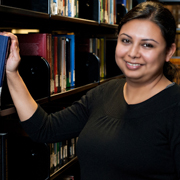 Arpita Nepal (AIPE 07) is an alumna of the Asia Institute on Political Economy (AIPE) in Hong Kong, but even before attending the program Ms. Nepal had a strong interest in the ideas of free-market economics, and in taking action on those ideas to bring about change in her home country of Nepal. In 2006, as Nepal transitioned from a monarchy into a fragile republic, Ms. Nepal, along with a group of friends and colleagues, formed Samriddhi (The Prosperity Foundation), to bring market-based solutions into the policy arena. “There were significant challenges in setting up the foundation. The acceptance of the ideas we were promoting was very low. Apparently we were the first generation of people setting up a free market think tank in Nepal,” said Ms. Nepal.
Arpita Nepal (AIPE 07) is an alumna of the Asia Institute on Political Economy (AIPE) in Hong Kong, but even before attending the program Ms. Nepal had a strong interest in the ideas of free-market economics, and in taking action on those ideas to bring about change in her home country of Nepal. In 2006, as Nepal transitioned from a monarchy into a fragile republic, Ms. Nepal, along with a group of friends and colleagues, formed Samriddhi (The Prosperity Foundation), to bring market-based solutions into the policy arena. “There were significant challenges in setting up the foundation. The acceptance of the ideas we were promoting was very low. Apparently we were the first generation of people setting up a free market think tank in Nepal,” said Ms. Nepal.
Ms. Nepal discovered AIPE while looking for a way to continue and deepen her economics studies after graduating from Tribhuwan University in Nepal. “AIPE connected me with Professor Morriss. It was one of the best learning experiences I ever had,” said Ms. Nepal. “I think I learned a lot more there than I did in the two years I spent in my graduate course in Nepal.”
In particular, through AIPE and Morriss’ class, Ms. Nepal says she gained a better understanding of the principles of economics and the role think tanks can play in public policy. She also learned in greater depth the fundamental ideas of the American Constitution, a document with which she had limited prior exposure. According to Ms. Nepal, it was studying the Federalist Papers that was the most influential part of the program because they helped shape her views on policy – views she was able to take back to Samriddhi as well.
Ms. Nepal was one of the first from Samriddhi to attend AIPE. Since then, the foundation has made an effort to continue sending its staff to the TFAS program, boasting a total of 10 alumni and counting. Samriddhi helps TFAS by identifying passionate and dedicated students to attend the program in Hong Kong, but the benefits are mutual; a solid understanding of the ideas Samriddhi promotes – rule of law, limited government, market economies, and individual freedom – helps them become better advocates of these ideas at home.
According to Ms. Nepal, her country needs fresh ideas to respond to the growing influence of communism and ethnically rooted conflict. And, she says, that time is now as Nepal is in the process of creating its own constitution. Samriddhi has made an admirable effort to work with politicians both open and hostile to these ideas – to facilitate discussion on market- and liberty- based solutions. In fact, they have even found politicians that are willing to advocate for some of their policy proposals. One group, for example, is making progress in removing a state subsidy for fertilizers.
In addition, Samriddhi plans to publish a Nepali translation of F. A. Hayek’s The Road to Serfdom in 2012 and hopes to expand their audience with their new “Campaign for a Livable Nepal.” However, the partnership with TFAS has helped reinforce their message, and she hopes that a continued cooperation will allow them to do more. With the help of TFAS – through visits from faculty, and by continuing to send Samriddhi’s staff and students through AIPE – they would like to create their own institute and liberty-friendly network in the South Asian region, expanding their reach, spreading the message to a wider audience. According to Ms. Nepal, this is a crucial moment in Nepal’s political development. Through the content and training TFAS can provide, she hopes more Nepalese can learn about what she calls the “simplicity and beauty of the American Constitution.”
Ms. Nepal is still actively involved with Samriddhi and is also pursuing a graduate degree in economics at George Mason University.

